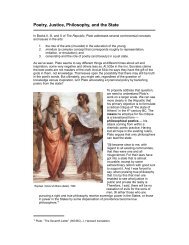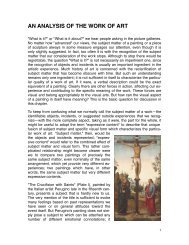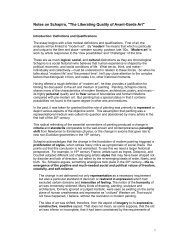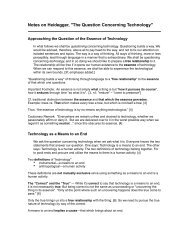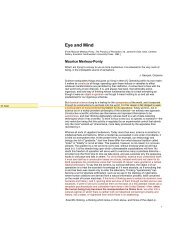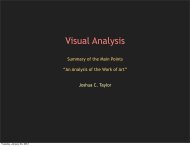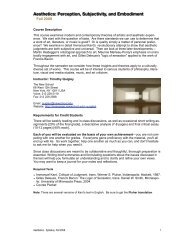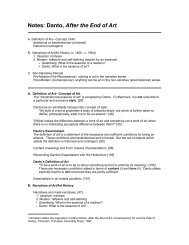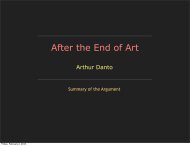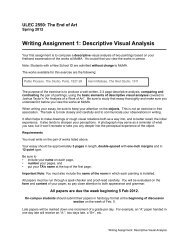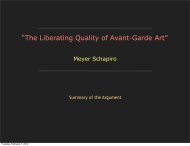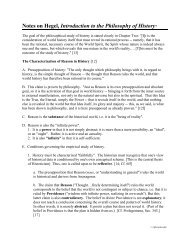egins with <strong>the</strong> questions, "What is it?" and "Why does it look <strong>the</strong> way it does?" According <strong>to</strong>Aris<strong>to</strong>tle, <strong>the</strong> answer always involves four "causes".1. material: because it's made of marble.2. efficient: because it was made in this particular way, by a sculp<strong>to</strong>r with a hammer andchisel, ra<strong>the</strong>r than some o<strong>the</strong>r way, e.g. by modeling in clay.3. formal: because it has <strong>the</strong> form it has, i.e. an athlete throwing a discus.4. final: because it has a purpose or goal, e.g. <strong>to</strong> present an ideal type of human being, or <strong>to</strong>pay tribute <strong>to</strong> a great athlete, etc.This analysis of a thing in<strong>to</strong> its four causes wasapplied <strong>to</strong> natural as well as artificial objects.Unfortunately, <strong>the</strong> division seems less plausible whenit's applied <strong>to</strong> certain elements of nature, say, forexample, s<strong>to</strong>ne or fire. What's <strong>the</strong> purpose of a s<strong>to</strong>ne?Aris<strong>to</strong>tle would say its purpose is <strong>to</strong> fall <strong>to</strong>ward <strong>the</strong>center of <strong>the</strong> earth. The purpose of fire? To rise <strong>to</strong>ward<strong>the</strong> heavens. The problem here is that such claimsseem arbitrary, contrived, and not terribly useful orenlightening. Thus, while it's easy enough <strong>to</strong> specify<strong>the</strong> material, formal and in some cases <strong>the</strong> efficientcause of a natural object, it often requires a stretch of<strong>the</strong> imagination <strong>to</strong> formulate a final goal or purpose forit.CosmologyFinally, I want <strong>to</strong> look very briefly at Aris<strong>to</strong>tle's viewof astronomical order and motion since this will be <strong>the</strong>view that various scholars will use <strong>to</strong> reject <strong>the</strong>insights of Copernicus (1473-1543) and Galileo (1564-1642) in <strong>the</strong> Renaissance.As we have seen, for Aris<strong>to</strong>tle, all change is movement <strong>to</strong>ward an end. This is known as ateleological view (and will be easily incorporated in <strong>the</strong> Middle Ages, by Thomas Aquinas(1224-1274) and o<strong>the</strong>rs, in<strong>to</strong> a Christian <strong>the</strong>ology which sees <strong>the</strong> world as "God's plan".)"Teleology" comes from <strong>the</strong> Greek word telos which means goal. The "-logy" in "teleology"comes from logos which, in this context, we can translate roughly as "<strong>the</strong> <strong>the</strong>ory or study of".Thus psychology is <strong>the</strong> study of <strong>the</strong> psyche; sociology <strong>the</strong> study of social forms; and teleology,<strong>the</strong> study of goals or goal-directed behavior.But it seems natural <strong>to</strong> assume that if everything has an end <strong>to</strong>ward which it moves, <strong>the</strong>re mustalso be a "place" from which it comes. In o<strong>the</strong>r words, it makes sense <strong>to</strong> ask about <strong>the</strong> ultimateends and starting points for <strong>the</strong> things that exist. Is <strong>the</strong>re a final resting place for all things – anultimate stasis in which all things come <strong>to</strong> a s<strong>to</strong>p and change no more? And was <strong>the</strong>re abeginning of all things – a time prior <strong>to</strong> <strong>the</strong> existence of things and before any changes occurred?Page 6 of 12 | 17thCentBkrnd.doc
One way <strong>to</strong> approach this problem of origins and goals is through a particular aspect ormanifestation, e.g. that of motion. According <strong>to</strong> Aris<strong>to</strong>tle, everything that is in motion must havebeen put in motion by something which was itself in motion. This is true on a microscopic aswell as a macroscopic scale. The principle assumption here is that every particular movementcan be traced back <strong>to</strong> a prior movement. But if this is true, what could possibly have put <strong>the</strong> firstthing in<strong>to</strong> motion? Aris<strong>to</strong>tle reasoned that <strong>the</strong>re must be a first mover which is itself unmoved.That unmoved mover constitutes <strong>the</strong> ultimate and eternal God in Aris<strong>to</strong>tle's scheme of things.Not a personal God – just a logical necessity – but eternal none<strong>the</strong>less.Aris<strong>to</strong>tle also argued that <strong>the</strong> unmoved mover is immaterial and that it initiates an eternalcircular motion which is both <strong>the</strong> basis of all <strong>the</strong> motions of natural objects in <strong>the</strong> universe andis <strong>the</strong> most perfect motion. Thus, <strong>the</strong> universe, he claimed, was composed of a set of concentricspheres at <strong>the</strong> center of which was a stationary earth. The motion of <strong>the</strong> stars and planets wasexplained in terms of <strong>the</strong> motion of <strong>the</strong>se concentric spheres.These are some of <strong>the</strong> fundamental components of Aris<strong>to</strong>tle's view of <strong>the</strong> physical andintellectual world around us. For reasons that were both politically and <strong>the</strong>ologically motivated,his ideas had <strong>to</strong> be reckoned with in most philosophical discussions throughout <strong>the</strong> modern age.We'll encounter <strong>the</strong>m again and again in our readings and discussions this semester.Next we turn <strong>to</strong> two o<strong>the</strong>r aspects that shaped scientific and philosophical thinking going in<strong>to</strong> <strong>the</strong>seventeenth century – Mechanism and Mysticism.II. MechanismThe fifteenth and sixteenth centuries brought a renewed interest in <strong>the</strong> observation of nature and<strong>the</strong> quantification of natural phenomena. For example, <strong>the</strong> rediscovery of perspectival drawing –geometrical and optical techniques that allow a convincing rendering of space in two dimensions– contributed <strong>to</strong> a transformation in our relation <strong>to</strong>, and representation of, <strong>the</strong> visual world. And<strong>the</strong> use of ma<strong>the</strong>matics <strong>to</strong> characterize <strong>the</strong> constitution, motion, and behavior of both terrestrialand astronomical objects challenged <strong>the</strong> role of deductive logic as <strong>the</strong> primary <strong>to</strong>ol of scientificinvestigation.The importance accorded <strong>to</strong> ma<strong>the</strong>matics during <strong>the</strong> scientific revolution of <strong>the</strong> sixteenth centurygoes back <strong>to</strong> Pythagorean, Pla<strong>to</strong>nic, and Arabic traditions. The emerging influence of <strong>the</strong> Arabworld on European scholarship during <strong>the</strong> Middle Ages, <strong>the</strong> rebirth of interest in Pla<strong>to</strong>, andtranslations of <strong>the</strong> works of Archimedes (287 ? -212 BCE) all contributed <strong>to</strong> an intellectual climatethat made possible <strong>the</strong> work of Copernicus, Kepler (1571-1630), Galileo, and <strong>the</strong> rise of a highlymechanistic and technological view of <strong>the</strong> universe.There were also practical and technological uses <strong>to</strong> which <strong>the</strong> new science could be put which,no doubt, stimulated a good deal of support and financial backing. So, for example, <strong>the</strong>ma<strong>the</strong>matical study of <strong>the</strong> use of cannons increased <strong>the</strong> efficiency of warfare, and significantimprovements in navigational and optical instruments led <strong>to</strong> more effective travel and moreaccurate medical research. The collaboration of philosophers, scientists, artists, and artisansPage 7 of 12 | 17thCentBkrnd.doc



